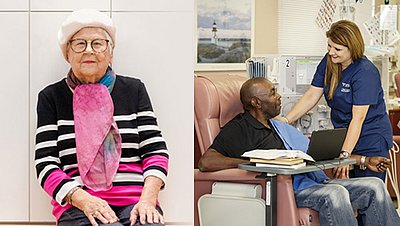Our patient stories and company features.
Our Way Forward
By Rice Powell, Former Chief Executive Officer and Chairman of the Management Board of Fresenius Medical Care
As you can probably tell, these past weeks have been extremely demanding – and I expect it to stay this way for months to come. Our teams are working tirelessly, knowing that patients count on them to deliver life-saving products and services – and I can’t thank them enough for their efforts. And yet as a CEO, I also need to look beyond the immediate. This crisis is fast-tracking developments that might otherwise have taken years to unfold – and I would be remiss if I didn’t take the time to consider how they might play out.
I’m excited to see the adoption of telehealth shifted into hyper-drive
Telehealth has long been an effective way to give people access to medical professionals from the comfort of their own homes. Health care providers can use phones, tablets, computers and specialized medical equipment to diagnose, treat, and educate patients from far away. The option has been around for decades, but while the technology improved quickly, uptake has long been slow.1 Now the pandemic is leading health care providers to go digital by the thousands, patients are flocking to the new offers and regulators everywhere are showing unheard support. This development is very encouraging for us as at Fresenius Medical Care, because we have long advocated for more home dialysis and telehealth options, which our patients are already using in record numbers. It seems as if the world has finally realized the value of telehealth – and I believe it will become an integral part of medicine going forward, allowing us to progress even faster and our patients’ lives to become easier and better.
Better Information Will Empower People
New technology isn’t always readily embraced. And rightfully so: Nobody wants their doctor or nurse replaced by a robot anytime soon. Fortunately, this isn’t what’s happening at Fresenius Medical Care at all. We believe artificial intelligence has only one sensible purpose: to support and enhance human intelligence, not replace it. Our AI algorithms are more like great assistants – they help our care teams, physicians and nurses make informed decisions to buy them time for what really matters: human contact.
- Care Teams that support our home dialysis patients in North America now use our connected health platform “TheHub”. It gives them real-time access to medical records so they can closely monitor patients and quickly intervene when they catch a potential issue.
- Physicians in some of our clinics use our “Doctor App” to assess a patient’s current values. This way, they can customize each treatment and answer questions right away. The app even helps them with important medical decisions. Like a great assistant, it improves the quality of their work and the physician-patient relationship.
- Patients in many countries use our “My Companion” smartphone app. It gives them a good overview of their current state of health and automatically reminds them to take medication or exercise.
So, if you ask me about this pandemic, I would say that it is incredibly tough right now, but it will eventually push us forward. We will use even more telehealth and advance interconnected intelligence even further. All of this will contribute to our core philosophy: offering the best possible treatment for our patients. And yet right now, the immediate health and safety of our patients and employees remain our top priority. As an industry leader in kidney care, we’re taking our responsibility very seriously. I am confident that together we can tackle this pandemic and continue to create a future worth living for our patients, worldwide, every day.
Related content
1 “From 2005 to 2017, only one out of every 150 doctor visits and one in every 5,000-10,000 specialist visits in the U.S. were conducted via telemedicine.” (Source: techcrunch.com/2020/04/04/why-telehealth-cant-significantly-flatten-the-coronavirus-curve-yet/)



